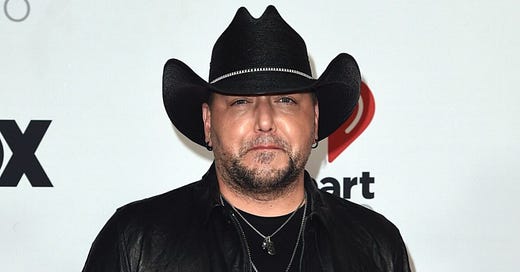[This blog will always be free to read, but it’s also how I pay my bills. So, if you like what you read, please consider a paid subscription. And yes, I do speaking engagements.]
This past May, country star Jason Aldean released a new song called “Try That in a Small Town,” which has lyrics that are—there’s really no nice way to say this—corny as hell.
I’ve been listening to country music all my life, and I gotta say that Mr. Aldean’s latest single sounds as though ChatGPT were asked to write an excessively generic bro country song sung by a white nationalist and this is what we got.
There are many commentators correctly pointing out that the song amounts to a symphony of racist dog whistles, but also: I just find it so incredibly boring as to be tedious beyond belief.
“Bro country” as a sub-genre tends to be tedious because it prioritizes commercial value to a specific demographic—aggrieved, conservative white men—over storytelling, which, in my humble opinion, is what historically makes country music so damn compelling.
I grew up watching CMT (Country Music Television) and listening to country radio, and I firmly believe the ‘90s were a golden age for the genre. George Strait, Garth Brooks, Reba McEntire, Trisha Yearwood, Randy Travis, Alan Jackson, etc. — so many catalogues chock-full of superb storytelling.
And yet, even that cohort pales in comparison to the greats who became before them: Alabama, Dolly Parton, Hank Williams, Johnny Cash, Merle Haggard, Loretta Lynn, etc. etc. etc. (I’m just rattling these off in no particular order, so please don’t get on me for not including one of your faves.)
Anyway, in more capable hands, country is a high art and fun as hell. Bro country, on the other hand, is off-brand fast food produced with the specific intention of placating insecure, white, conservative men who perceive the genre as a bastion for their beliefs in a changing world.
About two weeks ago, Mr. Aldean released a music video for his new single that left no doubt as to what he was attempting to communicate via the lyrics he sings (but did not write, which ain’t that surprising given that Mr. Aldean hasn’t written any of his singles since 2009).
The music video—which I will not link here but you’re than welcome to google it—has Mr. Aldean singing with his band in front of the Maury County Courthouse in Nashville, TN while a montage of violent scenes from protests against white supremacy are projected on the building.
The intent of this imagery is very clear: Mr. Aldean is attempting to pander to white nationalists who believe that Black Lives Matter protestors are, somehow, a threat to The Heartland™ and that, somehow, “small towns” are shining beacons of patriotic light in the chaos.
It doesn’t help that, as many commentators have pointed out, the Maury County Courthouse is the site of the 1927 lynching of Henry Choate, a Black teenager who was murdered by a white mob after being falsely accused of raping a young white woman.
The song and video together essentially equate protesting white supremacy with violent crime whilst simultaneously threatening said protestors with violence if they ever do “try that in a small town.”
You get the picture. It’s racist as fuck, and it should be called out as such.
It’s so bad, in fact, that CMT pulled the video from rotation only four days after its release, which, in case you’re wondering, is extremely rare.
So, not great, to say the very least, but there’s something else to all this that I believe isn’t being discussed enough: what exactly is a “small town”?
According to a 2020 report from the U.S. Census Bureau (“America: A Nation of Small Towns”), incorporated places of the small variety are defined as having a population of less than 5,000 residents.
Interestingly, under that definition, the report points out that 76 percent of the nation’s population live in small towns, and more than 40 percent live in towns with a population of less than 500.
Thus, if you randomly pick a resident of the United States at random, it is more than likely that person lives in a small town.
Even more interestingly: Jason Aldean is not one of them and never has been.
Mr. Aldean was born and raised in Macon, Georgia — which, at more than 157,000 residents, is the fourth largest city in the state and ranks #166 nationally. That may not seem all that high up until you consider it’s out of 19,500 incorporated places in the United States.
That means Macon has a bigger population than 98.5 percent of places in our country, which isn’t too surprising if you know anything about Macon. It has not one but TWO airports. It has six hospitals. It has five college campuses. It has robust local media, print and television.
But here’s the biggest clue that Macon isn’t a “small town”: tens of millions of folks who’ve never visited Macon have at least heard of it. It’s referenced in Margaret Mitchell’s “Gone With the Wind” and in a “Simpsons” episode and in countless books on the Civil War given that Macon was the official arsenal of the Confederacy.
Mr. Aldean did spend summers with his father in Homestead, Florida — which has a population of over 80,000. That’s still a far cry from being a “small town” and even moreso when you consider that it’s a suburb of Miami and has a population density several times that of Macon.
Mr. Aldean’s entire professional career has been spent in Atlanta (pop. 498,715) and Nashville (pop. 689,447), so there’s ain’t any help there, either.
So, it has to be asked: is Mr. Aldean confused? He could be, and I think I may have found a clue as to why.
Mr. Aldean, who has shaped his career around projecting the image of a good ole boy from simple beginnings, is an alum of the Windsor Academy, a K-12 private school in Macon that has a not-so-cheap tuition price tag of nearly $9,000 annually for every student in 5th grade and above.
Hey, don’t worry, y’all: the Windsor Academy has a rigorous financial aid program and offers limited scholarships. Of course, if a student’s family does fall behind on tuition payments, barring extraordinary circumstances, they’re ineligible to receive financial aid until satisfying delinquent payments.
I bring this up because the full student body, across all grades, K-12, is just over 300 students. This could be the reason Mr. Aldean believes he relates to small town life: the vantage point of his small private school experience.
So, essentially, with Mr. Aldean, what we have here is a prep school dilettante who was raised in a big city, singing a song he didn’t write about an experience he never had, accompanied with a music video of which much of the footage was filmed in Canada.
Mr. Aldean has about as much credibility describing the “small town” experience as I would have working alongside the professionals of a NASCAR pit crew, and trust me, folks: you sure as hell don’t want me doing that. I respect my limitations.
Listen, y’all, this isn’t supposed to be literal. We all sense that. Mr. Aldean is not really attempting to describe actual “small town” life. He’s trying to pander to a specific feeling of a particular demographic that happily codes their bigotry with information shortcuts.
“Small town” does not mean a place that is literally small; it’s a symbol of a passed society for which Mr. Aldean and like-minded folks openly pine. It’s openly fantasizing for a time in which there was no question that folks who look like Mr. Aldean called all the shots.
But even aside from the biggest problem here—the racist bullhorn aspect—it’s also just incredibly insulting to folks who live in small towns. It’s condescending. It’s infantilizing.
The vast majority of folks who live in small towns don’t feel threatened by those who are different from them. They don’t solve their problems with violence.
It erases people of color (particularly Black folks), LGBTQ people, religious minorities, and social progressives who are just as much apart of small town life (and always have been).
That’s what’s most glaring about Mr. Aldean’s pandering: it’s obvious he simply doesn’t know the folks who live in small towns beyond his tourism.
In 2017, Mr. Aldean was performing onstage at the Route 91 Harvest country music festival when a mass shooter opened fire from the 32nd floor of the Mandalay Bay Resort in Las Vegas, murdering 60 people. It is still the deadliest mass shooting by a lone gunman in American history.
I don’t blame Mr. Aldean one bit for his response in that moment. I truly don’t. He could have used his microphone to urge folks to seek cover. He could have rushed into the crowd to save folks or administer aid. Instead, he ran backstage. I would have done the same thing. I think most folks would. I don’t think I would have had the wherewithal to be immediately helpful in that chaos.
Then again, I would never release a song, six years later, suggesting otherwise, and that’s partly the problem here.
Let’s hope Mr. Aldean embraces the concept of extending grace and nuance toward others as much as he expects it for himself.
Hi, I’m Charlotte Clymer, and this is Charlotte’s Web Thoughts, my Substack. It’s completely free to access and read, but it’s also how my bills! So, please do kindly consider upgrading to a paid subscription: just $7/month or save money with the $70/annual sub. You can also go way above and beyond by becoming a Lifetime Member at $250.














Share this post